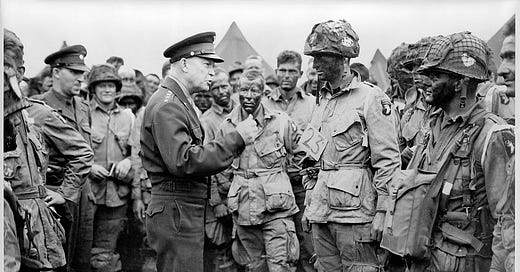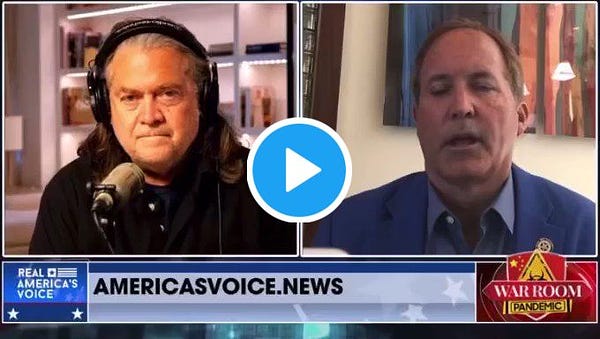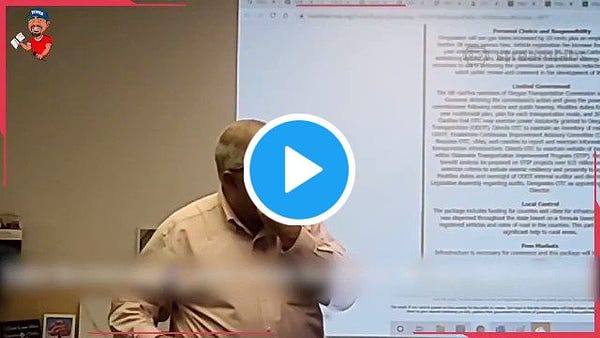Today, Katie Benner of the New York Times broke the story that former president Trump tried to use the Department of Justice to try to overturn the results of the 2020 election. Five emails provided to Congress show Trump’s chief of staff, Mark Meadows, asking the acting attorney general, Jeffrey A. Rosen, in December, to investigate rumors of voter fraud. One of the fantastical stories Meadows wanted investigated was the story that “people in Italy had used military technology and satellites to remotely tamper with voting machines in the United States and switch votes for Mr. Trump to votes for Joseph R. Biden Jr.”
The Department of Justice is not the president’s to command. It is supposed to enforce the laws of the United States and administer justice. The office of the president has its own lawyer—the White House counsel—and the president can also have their own personal representation. That Trump tried to use our own Department of Justice to overturn the will of the American voters is eye-popping.
But that was not the only news of the day. We also learned that the Texas attorney general, Ken Paxton, told Trump advisor Steven Bannon on a public show that had he not been able to block a great deal of mail-in voting in 2020, Biden would have won Texas.
We also learned that Oregon Representative Mike Nearman, who was already in trouble for opening the doors of the Oregon Capitol to anti–coronavirus restriction rioters on December 21, held a meeting beforehand, on December 16, to plot the event. An attendee filmed the talk, which set up “Operation Hall Pass.” That operation ultimately opened the Oregon capitol building to far-right rioters, who endangered the entire legislature. The video, which shows Nearman winking and nodding at setting up the invasion, has raised questions about whether other Republicans worked with insurrectionists in other settings.
It is an odd day for these stories to come to light.
Seventy-seven years ago today, on June 5, 1944, General Dwight D. Eisenhower was preparing to send Allied troops, who fought for democracy, across the English Channel to France. There, he hoped, they would push the German troops, who fought for an authoritarian fascist state, back across Europe, securing a victory for democracy over authoritarianism.
More than 5,000 ships waited to transport more than 150,000 soldiers to France before daybreak the following morning. The fighting to take Normandy would not be easy. The beaches the men would assault were tangled in barbed wire, booby trapped, and defended by German soldiers in concrete bunkers.
On the afternoon of June 5, as the Allied soldiers, their faces darkened with soot and cocoa, milled around waiting to board the ships, Eisenhower went to see the men he was almost certainly sending to their deaths. He joked with the troops, as apparently upbeat as his orders to them had been when he told them Operation Overlord had launched. “The tide has turned!” his letter read. “The free men of the world are marching together to Victory!”
But after cheering his men on, he went back to his headquarters and wrote another letter. Designed to blame himself alone if Operation Overlord failed, it read:
“Our landings in the Cherbourg-Havre area have failed to gain a satisfactory foothold and I have withdrawn the troops. My decision to attack at this time and place was based upon the best information available. The troops, the air and the Navy did all that Bravery and devotion to duty could do. If any blame or fault attaches to the attempt it is mine alone.”
The letter was, of course, never delivered. Operation Overlord was a success, launching the final assault in which western democracy, defended by ordinary men and women, would destroy European fascism.
[U.S. Army photograph, 1944, Library of Congress]
—-
Notes:
https://www.nytimes.com/2021/06/05/us/politics/mark-meadows-justice-department-election.html







A couple minor corrections about the D-Day material (since this happens to be the kind of history I am a recognized Subject Matter Expert on). Eisenhower is visiting the paratroopers of the 101st Airborne, who would be the first Allied soldiers to land in France. The ships carrying the troops had departed England on June 4, since D-Day was supposed to be June 5. However, the weather intervened. The invasion hung in the balance - if they were recalled there was a good chance momentum would be lost to try a do-over and the forecast for the rest of June was worse. The ships were milling around in the English Channel and there was every chance the Germans would spot them. Finally, Eisenhower's weatherman, Colonel Stagg, detected what he thought might be a momentary break in the weather - he figured the odds were 60% in his favor. So a few hours before Eisenhower visited the Screaming Eagles, he OKed the invasion for June 6. As it was, there was a 36 hour break in the bad weather, after which it was worse, as forecast. But the initial invasion had made it. The greatest invasion in history was on a knife edge of failure all the way.
Today is also the 79th anniversary of the victory at the Battle of Midway. Following the destruction of the four Japanese carriers at the heart of the Mobile Fleet on June 4, Admiral Yamamoto ordered the fleet to turn around that night.
I had the privilege of knowing the guy who won the battle, Dick Best, whose almost single-handed attack on the Akagi turned the tide from what had been an American defeat to what would be victory. He always thought, though, that he served his country better than that day over the Japanese fleet, when he was the Librarian at RAND Corp, and "turned a blind eye" to Daniel Ellsberg and Anthony Russo's smuggling of the Pentagon Papers out of RAND. "The American people deserved to know what had been done in their name."
They really were The Greatest Generation. Being able to know them and write about them has been the privilege of my life.
It is an hour before Sunday, and I wondered why Heather wrote as much as she did, until I read it. Good and evil came off the page.
I looked at the photo of General Eisenhower with the soldiers. My husband, Mark, was one of 73,000 American soldiers that landed in Normandy. He and a few of his war buddies went back a couple of times after the war.
“A people that values its privileges above its principles soon loses both.”
― Dwight D. Eisenhower
Heather took me to church early.
Thank you, Heather